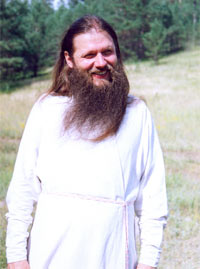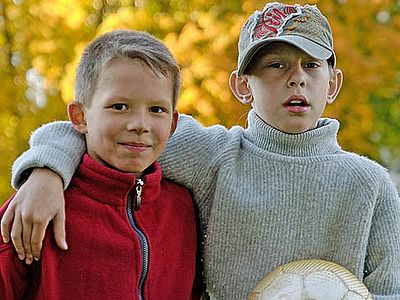
A discussion with Archpriest Artemy Vladimirov, rector of the Church of All Saints in Krasnoe Selo, Moscow.
- Batiushka, you have vast experience in teaching. You have taught in secular schools as well as in Church educational organizations. You have also conducted the courses now gaining some momentum in Russia, called, “Fundamentals of Orthodox Culture.” What qualities, in your opinion, should a teacher have if he wishes to teach this discipline?
- By God’s Providence, I have been connected with school teaching since 1983. I remember, when I was a young teacher, I came under strict judgment by soviet bureaucrats, who accused me of non-standard thinking. They requested that I be removed immediately from the soviet high school system, for in the 1980’s everything was supposed to conform to a particular format. However, in teaching generally, and in teaching Orthodox culture particularly, there should by no means be any standard approaches. One mustn’t follow a path well-trodden and fixed for all time. We, the educators of the 21st century, cannot get away with cliche phrases and generalities. We are pioneers, and are not afraid to discover new horizons.
When you enter a school auditorium for the first time, you must first of all be clear about the following: children are joyful, knowledge-loving creatures who look at the world (provided they have not been captivated by computer games — more on this later) with wide-open eyes. Therefore, every educator — and especially, every instructor of God’s Law — must have a fresh and sharp perception of the world, the ability to approach a subject from an entirely unexpected side. And most importantly, he must understand that the teacher and his pupils associate not on an intellectual, mental, discursive, or rational level, but rather through the heart and soul. Thus he can, and indeed must, begin this educational process with a secret prayer for its success.
- It is probably not so easy to make this sort of contact with today’s children…
- Today our young audience knows more than we ourselves know about the meaning of “good” and “bad.” They are overburdened with all manner of information. Often when associating with children you can observe and feel an untimely weariness with life. They are deprived of their childhood, of that unrepeatable time when (as it was for us as children) the adults would try to protect the child from crude, negative, and impure subjects, images, and impressions. Today’s educator can be compared to a soldier from the Ministry of Emergencies; to a rescuer who has arrived at the scene of an earthquake or shipwreck. His task is to pull some living being from beneath the rubble.
So today, coming into a class of high school students (I am speaking here of the situation in Russia’s capital city), you involuntarily bristle, because you can determine the moral state of your audience by the look in their eyes. One of them looks at you with a heavy, indifferent, weary gaze, as if to say, “I don’t regret, or call, or weep, / like the steam arising from white apple trees, I’m done, / overcome by withering gold; / no more shall I be young.”[1] Meanwhile, from another quarter you are being watched by a youthful being, who for some reason had no time to dress herself sufficiently for her lesson on “Fundamentals of Spiritual Culture.” All which was intended to be hidden from strangers is flashing forth. You try to understand what makes this being tick, but instead you lower your gaze in embarrassment — so sharp, assessing, and unabashed does her look seem to you. It is in exact accordance with the words of Solomon, The fornication of a woman shall be known by the haughtiness of her eyes, and by her eyelids (Sirach 26:12).
Thus, today’s teacher of spiritual culture — or lessons on morality, piety, or however such a discipline might be named—requires integrity of soul and life forces of love and truth that can withstand the pressure of these sarcastic, cynical looks, the heckling, indifference, and even plain rudeness. A teacher must be unconditionally sincere, and have warmth of heart.
The modern educator should understand that it is not possible for him to fit his material onto the Procrustean bed[2] of themes inherited from the late 19th, early 20th centuries. And these themes themselves, be they sacred history of the Old and New Testaments, the history of the Christian Church, or Liturgics as the total knowledge of modern Church Services, should be taught with great tact, sensitivity, and caution; most importantly, they should be related to those subjects which touch the young, modern audience in a living way. As for the servants of Aesculapius — doctors, whose main tenet is “Do not harm!” so should the teachers of spiritual culture have has their main tenet, “Do not bore!” Do not be a burden to your audience, but rather a joy.
We, educators, should look at our own selves very carefully and listen to ourselves objectively. And during the course of the lessons themselves, as we relate to the children, we should probe to ensure that they are not exhausted or burdened by our speech. I believe that during the coming years in Russia, not only will these subjects be legalized in every public school, but will even be introduced as part of the required curriculum. And may God grant that educators would be able to lay their treasure trove of educational experience and methodical approach at the children’s feet in that hour when they begin to talk with them about the intransient, the treasured, the ideal, pure, and beautiful — about everything which lives in the field of Orthodox culture.
- One would expect that the children who participate in Church schools are likely to be more modest, obedient, attentive…
- Our children live neither in caves, nor in the spiritual heights. They come from modern families; and even if these families participate in the life of the Church, even if they are pious, nevertheless, no one and nothing can protect our students from a wide range of influences — those “evil winds.” A teacher of spiritual culture should be an excellent diagnostician, he should be a spiritual doctor, who, upon entering the classroom at the beginning of the week, is obligated to make an immediate diagnosis discerning which wind, what virus has penetrated and conquered the minds and hearts of those teenagers during the past three or four days since their last meeting.
Last week it was the wind of coarse words. There is currently a problem in Russia: our mouths and lips have turned into a sort of bakery. Blini,[3] fudge, and various verbal buns stuffed with vulgarity, brazenness, and impure thoughts seem ever to be popping out. To simply pass these products by with indifference would mean allowing all of our great expectations and good intentions to go down the drain.
This week you see that the girls have begun chasing after the boys and battering them with book bags, filled with books, as a sign of undying love. And you need to prevent childhood trauma, and at the same time show that there are other ways for members of opposite sexes to make friends; you need to lead their secret mutual interest onto some more peaceful, constructive path.
Next week you will come against other, new temptations. Therefore we, Orthodox educators, are no ivory tower dreamers. We are realists, pragmatists, neighborhood doctors who participate in people’s fates.
Thus are we army officers, we stand in the front lines, where “horse and man were mixed in piles;”[4] cannon balls, the whistle of shot, clouds of earth rising hither and yon, the neighing of horses, calls to victory, shrieks of the wounded.... And there, in the midst of this military havoc, stands the educator like a hastening cavalryman. He looks out coolly at what is taking place, trying to bring comfort, to rescue one or another teenager, and at times even to guard with his own breast some youthful, inexperienced being.
- You have in your parish a special regard for the legendary image of Alexander Pushkin’s nanny. What is the significance of Arina Rodionovna for our times?
- We have such a reverence for Arina Rodionovna in Krasnoe Selo that as a visitor to our church you will see a sign at the monastery gate[5] which reads, “Be a guest of Arina Rodionovna.” Having entered the grounds, you will see the sculpture of a nanny with the young Alexander Sergeevich, whose head she strokes with her sinewy, kind hand. Arina Rodionovna is a symbol of warm care, inexhaustible love, a wellspring of spoken consolation. This is the heart of the Russian woman, which, like a candle, spreads light and warmth around herself, placing her whole life upon the altar of the upbringing of our nation’s sons. The poet’s amazing feel for language was formed under her influence, and those sacred reminiscences which led him back to the bosom of the Church after his superficial denial of “deep, ancient tradition” are most probably owing to her. She is an old, kind nanny, who lives wholly through her grandchildren or wards, being to them at times both a mother and a father.
Arina Rodionovna is that very Holy Russia, presented to a young person not in the form of grandiose paintings, nor in the little understood Church Slavonic language, nor even in the image of 15th – 16th century architectural masterpieces, but rather in the countenance of a living woman, aged before her time from labors beyond her strength but not tormented, not broken or exhausted like the mother of Sonya Marmeladova, the heroine of Dostoevsky’s novel, Crime and Punishment.
Arina Rodionovna is living, warm-hearted, has that special essence, that gleam in her eyes; a simple woman whose every word is penetrated with prayerful warmth, at times even marked with prophetic power. Arina Rodionovna is that being who can console by the mere touch of a finger, “light as a dream.” She is the miracle of Russian culture, and its symbolic embodiment.
While the “specter of communism” walks about Europe, here in Russia we have lived out the “left-wing disorder” of communism, renounced the horrors of godless revolution (we do not even have a holiday anymore honoring the revolution), and having lit the candle of faith, we walk the streets of old Moscow looking for Arina Rodionovna. We hope that she would quickly come to our children who have fallen into the claws of virtual computer sickness, who are suffering from aggressive American Disney cartoons, and are deprived of the warmth of the family hearth either due to incomplete families or their parents’ inability to understand the hearts of their own offspring. This is why the question of Arina Rodionovna touches me so deeply.
It seems to me that these days every educator should cultivate within himself all of the above-described qualities. And just such a personality will emerge regardless of gender — an Arina Rodionovna, whose words were alive, direct, filled with the energy of love; in a word: wise. In a word: a personality in whom there is no bitterness or merciless reproach. I think that it is time for Arina Rodionovna to rise from the grave.
Although, to be honest, it seems to me that she did not die; she has only been hidden from our parents’ view. Today, children are waiting for that unobtrusive wisdom, that delicacy in assessing historical or moral phenomena; they are waiting for that bright peace with reality which can only be given by a teacher who is a formed person, who has obtained a spiritual core and foundation. And I would consider myself happy if Arina Rodionovna would sometimes come to me, if only in my dreams, and share her experience with me, the unworthy.
- You have touched upon the subject of computer games. It is natural for children to want to play games. Should this involvement in computer games be considered an illness?
- In our times, we are witnessing the following phenomenon: mankind, having exhausted its strength, has figured out new ways and methods of child education, of informing the children and introducing some manner of intellectual habit through computers. At the same time, we are becoming convinced that these inventions do not in the least justify themselves in obtaining the goal. Children are drowning in the quagmire of computer games. There is danger not only to their spiritual well-being, but also to their mental and physical health. They are becoming invalids before they have even had the chance to fully unfold their extraordinary powers. I sometimes think about how our country is not so technologically equipped (thank God), as other countries; yet every year more and more children are turning into computer Monte Christos — imprisoned voluntarily in the Chateau d’Iff of their own apartments. Their souls no longer see the living world. “The world holds no interest, and bread is not sweet.”
We are also witnesses to the terrible loss which children are inflicting upon themselves — motionless and dehydrated, they truly become patients. Certain modern psychologists kindly remind us that in 19th century Russia schizophrenia was called stony insensibility — the incapability of sharply perceiving things in the world. A person who is free from computer sickness can say together with Pushkin, “I am born to think and to suffer.”
A child who is, to the contrary, entangled in the virtual tentacles of the octopus of computer games, really does appear bloodless in the eyes of a trained specialist. He looses interest in living life, all his reactions are dulled, and he seeks no friendship with his peers. He becomes Kay of Han Christian Anderson’s fairy tale, and finds himself in the land of icy hearts, an eternal captive of the Snow Queen, playing his melancholy game of Hermann Hesse’s computer beads, repeating together with the story’s famous heroine the words, “Freedom or no freedom, it’s all the same.” He has lost the will to live. He no longer dreams about the future, he has fallen into a slavery of the most horrendous kind — computer instincts. His soul becomes filled ever more each day with aggression, pride, and fornication. All this is made even worse by the fact that it is all coming about in a hidden way — in the form of computer games.
- You have described a terrifying scenario. What antidote is there?
- It seems to me that any means are good. Furthermore, I think that it is now time for more active ways of using spare time. I am willing to remember the famous soviet era words to teenagers, “O sport, you are the world!” Let your child be completely worn out by sessions at the swimming pool, let him disappear in the stadium. Let him love communion with horses more than with people —only let him be protected from computer horrors.
Of course, we should praise those child-care workers, teachers, educators, and parents who succeed in inculcating a love for living nature in children. Having traveled around the provinces, I am convinced of the great importance of a child’s contact with living earth. The deep provinces still retain the practice, begun by rural soviet era schools, of obligating the children to work a certain number of hours on the school grounds, growing plants. This is wonderful! Our dear little children see the fruits of their labors. They are present at the miracle of inception and growth of a new life —from a seed to a flower, or even a carrot... But for a child living in the big city this unfathomable miracle is, alas, unattainable.
Another way is the study of a geographical area through hikes, travels, or visiting some secret, hidden areas of one’s native region. I think that it is ideal to organize children’s free time in this way, to bring them into contact with the history of their own localities. For example, there is a priest in Ryazan (who has a university degree in education) who has gotten permission for children to work in the local archives under the guidance of an expert. They searched for information on the clergy of Ryzan who served in days of yore. They compiled a list of priests beginning with the 15th century, then searched out their graves, where they planted crosses together with the children. Then, after celebrating the Divine Services, Batiushka asked the children to read the names in the commemoration books which they themselves had compiled. Thus, their labor in history became a spiritual labor, and an invisible link formed between former times and our own. Names culled from the depths of Siberian archival veins were presented to eternity. A dream! A truly poetic educator. Unfortunately, not everyone can do it just like this, but we are bound and obligated to find ways to actively fill our children’s spare time.
Now in Russia it has become fashionable (in the positive sense of the word) to take little boys to army bases in order to instill in them a warrior spirit. It’s nice for the soldiers as well to see the youngsters’ interest in their military activities and way of life. And you just have to see how the boys handle the armaments of previous generations, how they get photographed together with a bazooka or the elementary Kalashnikov machine gun.
Let all sporting achievements that breathe the fighting spirit into our youngsters, all that bears an element of good-natured excitement, be born, developed, and strengthened. These days, it seems to me that the main panacea against our civilization’s illnesses is to turn the little boys into Mowglys.[6] This does not mean leaving them to their own devices, or depriving them of time with their parents, but rather letting them get to know the world of animals and plants. Let them go diving, let them catch fish; as long as they do not lock themselves into a room and become flying Dutchmen or phantoms, and waste their energy on those endless, onerous, and soul-corrupting games.
- From what you say, I get the impression that cyber-addiction is becoming a serious problem in Russia. Do you meet many people suffering from this?
- I do meet them, unfortunately. I see that the devil sneaks up unnoticed, and then enters audaciously and boldly, like a commander, into the homes of affluent people who have managed to get their heads above the waters of poverty, and amuse themselves with the above-mentioned acquisition. Often these people are not able to organize their children’s free time. More precisely, they fail to recognize the seriousness of these computer games in time before their homes are filled with them. Often catastrophe comes from unexpected quarters. The child has everything he needs for complete mental, intellectual, and spiritual development, but instead he becomes an expert on game technology, and the flux of his passion swells to unimaginable magnitudes. In Japan, by the way, it is against the law for children to use computers until they have reached a certain age.
- Recently an inexpensive computer has been developed for use in schoolrooms of the Third World, as a way of spreading computerization all over the globe…
- I like what Vladimir Vladimirovich Putin had to say when he was recently in Belgorod. There was a recent congress there on the implementation of national priorities and demographical politics. The President was asked his opinion on the computerization of kindergartens. He answered, “Well, that is too much. We would have to send all the children to psychiatric clinics,” and brushed the idea aside. We express our gratitude to Vladimir Vladimirovich Putin for his sober approach and competent assessment of such insane initiatives. We likewise hope that his successor will also take heed.
[1] From a poem by Sergei Esenin [trans.].
[2] Procrustes, a figure from Greek mythology, had a bed on which his guests were supposed to fit; and if they didn’t, he would either cut off their extremities, or stretch them on a rack to the required size. Furthermore, the bed was secretly adjustable according to his cruel whim [trans.]
[3] The word “blin” (or pancake) has been turned into a Russian swear word as a slightly softer expression of the cruder word implied [trans.].
[4] From the epic poem “Borodino,” by Mikhail Lermontov [trans.].
[5] The Church of All Saints in Krasnoe Selo, Moscow, is part of what was before the Bolshevik revolution the Monastery of St. Alexis, Man of God. These gates were the monastery gates [trans].
[6] The boy raised by wolves in Rudyard Kipling’s Jungle Book.



